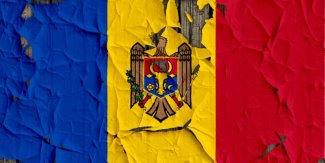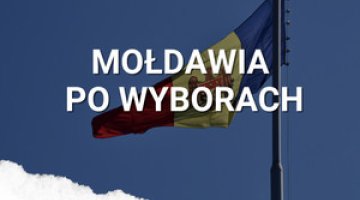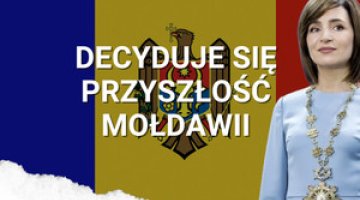Moldova’s political theatre. The balance of forces in an election year

Since the end of 2015 Vlad Plahotniuc, an oligarch and the richest man in Moldova, leader of the ruling, nominally pro-European Democratic Party, has been de facto the only person who counts in Moldovan politics and business. He is an extremely unpopular politician who has been accused of transforming Moldova into a classic ‘captured state’. However, he has been forced to work with Igor Dodon, the country’s nominally opposition and pro-Russian President, who enjoys the most public trust, as well as with the Socialist party (PSRM) which stands behind him. Both politicians have created a particular system of government which is something like a political cartel[1]. The parties which make it up are conducting a largely superficial ideological-political struggle which stirs up huge emotions and polarises society. The dominant role in the tandem is played by Plahotniuc, who is much more powerful, as he controls the government and the parliamentary majority, and is also the main beneficiary of the current system.
However, the system which has been created in Moldova is highly unstable and should be seen as short-term in nature. The greatest threat to Plahotniuc in the near future comes from the parliamentary elections scheduled for the end of 2018. Given the PSRM’s high popularity and the low levels of support for Plahotniuc and his party, the election will probably be won by the Socialists, who could form a parliamentary majority under President Dodon. For this reason, Plahotniuc has been conducting an intense campaign to improve the PDM’s abysmal poll ratings, and is working to undermine the prerogatives of the President. There is no doubt that tensions on the Moldovan political arena will accumulate over the coming months. The upcoming parliamentary elections will decide not only the shape of the current system, but also the business and political future of Vlad Plahotniuc.
Plahotniuc-Dodon: forced to cooperate
Despite his extremely broad political influence, his control over the state’s apparatus, his huge financial resources, many media assets and his own personal ambitions, Vlad Plahotniuc is not in a position to govern Moldova alone[2]. A key obstacle to the introduction of an authoritarian model of government is the marginal public support for him and his party. Only about 1-2% of the public support Plahotniuc, and fewer than 5% of voters will vote for his PDM party[3]. In such conditions, he cannot afford to try and seize power in the country and openly reject the democratic model, as this could lead to violent resistance from the public. This scenario is also impossible because of the opinion of the Western partners which support Moldova financially and politically, and with whom Plahotniuc, as a nominally pro-European politician, must reckon with. As a result, the oligarch must maintain some semblance of democracy to preserve power, and so he has been forced to work with Igor Dodon, the most popular politician with the Moldovan public, and the Socialist party, which has around 50% popular support.
This cooperation, although forced, is based on a community of interests between these two politicians. Both the President and Plahotniuc have to maintain the functioning clan-oligarchic system which operates in the country. In practice, this means preventing any groups which could threaten its existence from coming to power, and avoiding real reforms that would undermine its political position and block the possible illegal income which both politicians can receive. Nevertheless, the current system – even though its benefits to Dodon and Plahotniuc are only short-term – is not satisfactory for either of them. Plahotniuc’s ultimate goal, in fact, is to gain complete control over the Moldovan political scene; Dodon’s ambition is to gradually extend his influence within the framework of the existing system, and in the long term, to subjugate or remove Plahotniuc from both politics and business.
Mutual benefits
The greatest beneficiary of this model of government in its current form is Vlad Plahotniuc. The oligarch can encourage pro-European voters who distrust him and his party to vote for the PDM in the name of stopping the pro-Russian forces embodied by the ostentatiously pro-Russian Dodon. Just as importantly, the very popular president and his party have been exploited by Plahotniuc in talks with the country’s partners from the EU and the US. While they are aware of the oligarch’s true intentions, the chance that pro-Russian forces could seize power in the country allows Plahotniuc to convince the West that only he, with his considerable media and financial resources, can protect Moldova from taking a geopolitical turn towards Russia[4]. The West’s support for Plahotniuc is essential because it allows him access to financial resources and legitimates his unpopular government.
Dodon, who has great public support and regularly meets Vladimir Putin, serves the oligarch both as a liaison and mediator, facilitating contacts with the world of Russian business and politics[5], as well as a kind of shield, preventing the Kremlin from taking hostile political and economic activities towards Chişinău. For many months Plahotniuc, in order to lend credibility to his pro-Western image, win the favour of Western partners (particularly the United States) and strengthen the sense of threat from Russia (both externally and domestically), has been taking an unprecedentedly assertive line towards Moscow, as a result of which in 2017 relations between the Moldovan and Russian governments have de facto frozen[6]. Despite this, the Kremlin has not actually undertaken any serious retaliation[7]. It seems that one of the reasons for this political restraint, something rather unprecedented in Russian practice, is Moscow’s fear of damaging the image of Igor Dodon, who is the key pro-Russian politician in Moldova. From the point of view of the government in the Kremlin, he offers the hope that he might take full power in Chişinău in the near future.
The current political system also has short-term benefits for Dodon. First, as the leader of the opposition, and as a president with limited competence, he is de facto not expected to fulfil his election promises, and can focus primarily on image-building and criticising the government. Secondly, it seems certain that Dodon – like other senior Moldovan politicians – is deriving unspecified though tangible financial benefits resulting from his cooperation with Plahotniuc[8]. Although he constantly emphasises his opposition to the Democrats, Dodon has in fact regularly helped Plahotniuc’s party in forcing laws through parliament which are of essential importance to the oligarch. The most egregious example of this practice was the adoption by parliament (with the support of the Socialists) in May 2017 of a law changing the electoral system from a proportional to a mixed system, which increases the chances of Plahotniuc’s party obtaining a satisfactory result in the upcoming general elections.
This stage-managed conflict between Plahotniuc’s Democrats and Dodon’s Socialists has pushed the non-parliamentary opposition to the margins of public debate; lacking adequate financial and media resources, they are effectively unable to get their message to the public.
Weakening the president
The current arrangement between Plahotniuc and Dodon, while it is temporarily effective and beneficial for both parties, is still highly unstable. The leader of the PDM, although he clearly far outdoes the President in the scale of his influence and financial resources, and is probably in possession of materials which would seriously compromise him, is aware of the threat posed to him by this ambitious and popular politician. For this reason Plahotniuc, although he has been forced to cooperate with Dodon, has also taken action aimed at limiting his powers and room for manoeuvre. Back in December 2016, the Democrats took control from the President of the country’s central intelligence organisation, the Information and Security Service (SIS)[9]. Plahotniuc also managed to fill the position of the Attorney General with his own candidate. The most striking example of this practice, however, was the decision in October 2017 by the Constitutional Court (controlled by Plahotniuc) which made it possible to suspend the President’s rights in a situation where he refuses to appoint candidates approved by parliament to their respective ministries, or when he twice refuses to sign laws which have been adopted by parliament. The role of the President, until the contested acts have been signed, will be taken by the Prime Minister or the speaker of parliament (both of whom are trusted subordinates of Plahotniuc). This legally strange solution has already been applied three times. Suspending the President in the performance of his duties is an extremely convenient form of evasion, not only because it allows for the adoption of laws or changes in personnel which might be inconvenient (politically and personally) to the President, but more importantly, because they prevent Dodon from trying to force the government to initiating the impeachment process. Paradoxically, such a move would strengthen the President’s position, as removing the head of state requires a referendum, which would clearly keep Dodon in power and boost his legitimacy.
Igor Dodon has not responded in any firm way to the limitation of his powers. Apart from his open criticism of the government and the PDM (although rather not of Plahotniuc himself, which is indicative), he has not moved to organise any mass protest actions, for example, or any other attempts at resistance. On the contrary, the President has regularly emphasised that those who are guilty of actions which do not comply with the rule of law will be duly punished after the parliamentary elections. Moreover, Dodon has used the actions targeted at him to burnish his own image. He is able to present himself as a victim of the oligarchic apparatus of state, and explain his ineffectiveness as an inability to act. This passivity in the President is further proof of the existence of a temporary agreement between him and Plahotniuc. Dodon does not want to challenge the oligarch at this time, and is waiting to see how the situation develops, particularly with regard to the results of the upcoming parliamentary elections.
Plahotniuc’s strategy to retain power
In addition to the above-mentioned political actions, Plahotniuc is conducting an intensive campaign to improve the abysmal poll ratings of the PDM and himself personally. At the end of 2016 he officially took over the position of chairman of the party (having previously held the post of deputy leader)[10]. At the same time, taking advantage of his new position, he began to participate in official government delegations much more freely than before (including trips to Brussels, Strasbourg and Washington). The TV stations he owns have emphasised that he has been received by high-ranking foreign politicians, which increases his legitimacy to govern and builds up his image as a statesman. Plahotniuc is also making more public appearances in Moldova, including press briefings during which he personally Initialises new reforms, sets policies, announces staffing changes in the government, or announces actions popular with the public. At the same time, the anti-corruption bodies subordinate to him have displayed an unusual intensification in their activity. It has become common to see investigations being initiated, as well as arrests of high-ranking Moldovan officials or politicians (which had previously been rather rare). Although the government media portray this as a sign that the political system is being cleaned up, these activities are in fact designed (apart from having the desired effect on the public) to get rid of Plahotniuc’s political opponents[11].
At the same time, Plahotniuc has been using the services of at least three lobbying companies to improve his image (especially with regard to building up his position abroad): the well-known American company the Podesta Group, and the Prime Policy Group and Cornerstone Government Affairs[12]. These companies have arranged official meetings for him with representatives of the US government in Washington (mostly second-tier congressmen and senators). As mentioned earlier, Plahotniuc is trying to convince the EU and the US that he is the only major player on the Moldovan political arena capable of stopping pro-Russian groups from coming to power. To do this (in addition to the methods listed already), he regularly places articles in well-known international media such as Politico or the Wall Street Journal, in which he and other senior members of the government, such as the prime minister or the speaker of parliament[13], speak about the growing threat from Moscow and Moldova’s need for support from the West in order to maintain its pro-European course. This type of provocative behaviour towards Russia is also intended to emphasise the pro-Western nature of the Moldovan government. The plan to include a clause strengthening the country’s pro-European political course in the Moldovan constitution should also be seen in this context[14].
Post-election prospects
The system operating in Moldova today resembles a kind of top-down political theatre, in which the lead actors play out roles which are unrelated in any way with their authentic beliefs and views before a national and international audience. Due to the tension between the main characters (Plahotniuc and Dodon), this model can only continue in the short term. The moment which will decide its future form is the upcoming parliamentary elections. Because of their importance to Plahotniuc’s regime and his fear of a boost in Dodon’s position, it is almost certain that these will be some of the most opaque and deeply manipulated elections since 1991. All the indications are that, despite his extensive publicity and political activities, Plahotniuc’s party is not guaranteed a good result (it is currently teetering on the border of the 6-percent electoral threshold), still less that the PDM will win a majority enabling it to retain power.
Although it is difficult to conclusively predict the development of events in the coming months, it now seems that one of the more likely scenarios Plahotniuc is considering is an attempt to get the best possible result for the PDM while simultaneously taking action (including administrative moves) to limit the number of votes for the PSRM. In such a situation, it cannot be ruled out that Plahotniuc will work to form a coalition between the PDM and its satellite parties with the pro-European opposition (principally the Action and Solidarity Party (PAS) of Maia Sandu, which is currently supported by around 25% of the electorate)[15] or the Socialists. In this situation, the oligarch will try (as he has done in the past) to gradually marginalise his coalition partners and, by means of bribery and threats, bring deputies from Sandu’s party and the Socialists over to the PDM.
The coming months will be decisive for the shape of Moldovan politics and for Plahotniuc himself. The future of the oligarchy and the system it has constructed is currently uncertain, and depends equally on the results of the general elections, and the degree of the oligarch’s influence on President Dodon, which is difficult to assess unambiguously.
[1] One of the first people to use this term in relation to the functioning of the current political system in Moldova was the Moldovan analyst and political commentator Igor Botan. http://independent.md/ Igor-botan-intre-dodon-si-pd-exista-un-cartel-political-care-democratii-il-ajuta-sa-scoata-din-circuitul-political-partidul-lui-usatii/
[2] For more on Vlad Plahotniuc and the sources of his political and economic power, see Kamil Całus, Moldova: from oligarchic pluralism to Plahotniuc’s hegemony, OSW Commentary, 11 April 2016, https://www.osw.waw.pl/en/publikacje/osw-commentary/2016-04-11/moldova-oligarchic-pluralism-to-plahotniucs-hegemony
[3] Data from the Public Opinion Barometer, regular, twice-yearly surveys by the Moldovan Public Policy Institute (Institutul de Politici Audience); http://bop.ipp.md/ro
[4] Plahotniuc's narrative is also very convenient for those EU politicians (especially from Romania) who are aware of the oligarch's real interests and his actual attitudes towards reform, and support him for geopolitical, not ideological reasons.
[5] One example of such activities is Dodon's likely lobbying, during a meeting with the President of Gazprom in January 2017, for Vasile Botnaru's candidacy to become director of MoldovaGaz, the Moldovan monopoly company in the field of import and distribution of gas, most of whose shares belongs to Gazprom. Botnaru is a close associate and confidant of Plahotniuc.
http://unimedia.info/stiri/vrea-sa-puna-mana-pe-moldovagaz-nastase-dodon-a-promovat-la-moscova-candidatul-lui-plahotniuc-pentru-sefia-acestei-intreprinderi-127442.html
[6] Back in March 2017, the Moldovan PM presented the Russian ambassador with a note in which he protested against how Moldovan officials visiting Moscow had been treated. In May, five Russian diplomats were expelled from Chisinau on charges of espionage. In August, Chişinău announced declared Dmitry Rogozin, Russian deputy prime minister and the President of the Russian Federation's special representative for Transnistria, persona non grata.
[7] The only response has been the expulsion in May 2017 of five Moldovan diplomats in retaliation. Indirectly, the issue by an investigative committee of the Russian Federation of an arrest warrant (essentially symbolic) for Plahotniuc on charges of murdering several people may be taken as a reaction to the government's anti-Russian activities. See http://www.mid.ru/ru/foreign_policy/news/-/asset_publisher/cKNonkJE02Bw/content/id/2772287
[8] Investigative journalists in Moldova have highlighted this: http://jurnal.md/ro/politic/2016/11/8/spunem-dodon-subintelegem-plahotniuc-liderul-psrm-partenerul-oligarhului-in-scheme-dubioase-si-colacul-de-salvare-al-lui-plahotniuc/
[9] http://newsmaker.md/rus/novosti/sib-perehodit-pod-parlamentskiy-kontrol-28787
[10] https://www.zdg.md/stiri/stiri-politice/ultima-ora-vlad-plahotniuc-este-noul-presedinte-al-pdm
[11] Proof of this is that the people arrested have long been enemies of Plahotniuc. They include Petru Lucinschi, a senior politician in the PLDM, Vlad Filat's party, and also the owner of a TV station unfavourable to Plahotniuc; and Dorin Chirtoaca, mayor of Chişinău and deputy head of the Liberal Party, which until recently was considered as a satellite to the PDM, but did not support changes to the electoral system which would have favoured the PDM.
[12]http://totul.md/news/tretja-ne-lishnjaja-stalo-izvestno-o-kontrakte-dempartii-s-eshhe-odnoj-lobbistskoj-kompaniej-iz-ssha/
[13] Although these articles have appeared under Plahotniuc's name, Prime Minister Pavel Filip and the speaker of parliament Andriana Candu, they have undoubtedly been prepared by specialist ghostwriters.
[14] http://www.noi.md/ru/news_id/259521
[15] Sandu has categorically ruled out any coalition with the PDM. However, if the Socialists achieve a very good electoral result, they may come under a great deal of pressure, especially from those Western partners (including Romania) for whom Igor Dodon's group coming to power would not be in their interest.





